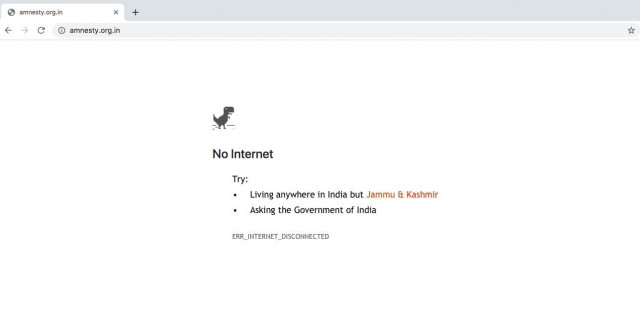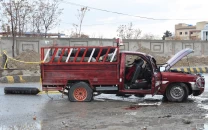Internet shutdown in IOJ&K, longest ever in a democracy?
The Express Tribune interviews Raman Chima, Asia Pacific policy director at Access Now advocacy group

The Express Tribune interviews Raman Chima, Asia Pacific policy director at Access Now advocacy group
It is being said that the internet shutdown in the disputed territory, which was implemented last August just before imposing a security lockdown and revoking the region’s special autonomous status, is the longest ever in a democratic country.
To know more about the specifics of the ban, and the justification provided by New Delhi, The Express Tribune spoke to Raman Chima, Asia Pacific policy director at Access Now, an international advocacy group dedicated to open and free internet. Excerpts:
ET: Last month, the Indian Supreme Court condemned the months-long internet shutdown in IOJ&K. Has there been any change on the ground since the ruling?
Chima: Subsequent to the Supreme Court of India’s ruling, Indian authorities issued new orders on limiting internet services to users. They partly increased the internet services [2G] to users, but banned the usage of 3G and 4G connectivity that is otherwise available to the rest of India. They also issued orders banning access to many social media services and issued a “whitelist” of websites which could be accessed by residents in the affected areas.
ET: Police have reportedly initiated a crackdown against virtual private networks. Are VPNs still working in IOJ&K?
Chima: Indian authorities continued with orders calling on surveillance and monitoring of internet connections, and have recently initiated prosecution of users using VPN services, charging them under the Unlawful Activities Prevention Act – an unprecedented first in India, which has been condemned by civil liberties organisations as unconstitutional and illegal. VPN access and usage is otherwise not banned in the Republic of India, and is not legally blocked at the national level.
Selective policing: Internet shutdown in Kashmir and beyond
ET: What legal argument has the Indian government presented before the top court to defend the internet blackout?
Chima: In defending the shutdown, lawyers for the Indian government argued that it was required for national security and upholding law and order, including allegations of cross-border disinformation, and the usage of online communications by accused extremist organisations.
The Supreme Court of India held that the use of the internet was crucial to the fundamental rights of speech and expression, and the right to life and liberty under the Indian constitution, and any restrictions on that had to be judicially checked to ensure that the executive action had not exceeded constitutional standards, including that of necessity and proportionality.
ET: Is the internet shutdown in the disputed valley the longest ever in a democracy? Are there any other countries which have restricted the services for so long?
Chima: The current disruption of internet services in the areas of Jammu and Kashmir -- coupled with the shutdowns ordered in 2018 – currently represent one of the longest periods of intentional disruption of internet access affecting a large population (up to 10 million people) by an established democratic government in the world. The longest continuous internet shutdown in 2019 -- and which continues till date -- is the shutdown ordered among several townships in Rakhine and Chin states of Myanmar by the government there.
ET: If internet suspension and ban on use of VPN continues, what alternatives do Kashmiris have to access the World Wide Web?
Chima: If the suspension of internet services continues, then residents in Jammu and Kashmir unfortunately have very restricted opportunities to easily access internet services. Some have tried using the fixed line public services available at certain locations, which face both usage restrictions as well as considerable state directed surveillance mandates.
Press has already documented that the restrictions on internet services have forced many Jammu and Kashmir residents to have to resort to train travel in order to use internet communications, and other jury rigged workarounds that are not sustainable for mainstream life.
This has also caused incredible disruption to businesses and attempts by the Indian government itself to bring more investment and other development projects to the region. Residents can also challenge these restrictions either before the Jammu and Kashmir High Court, or other constitutional courts in India - including potentially moving new legal applications before the Supreme Court.



















COMMENTS
Comments are moderated and generally will be posted if they are on-topic and not abusive.
For more information, please see our Comments FAQ